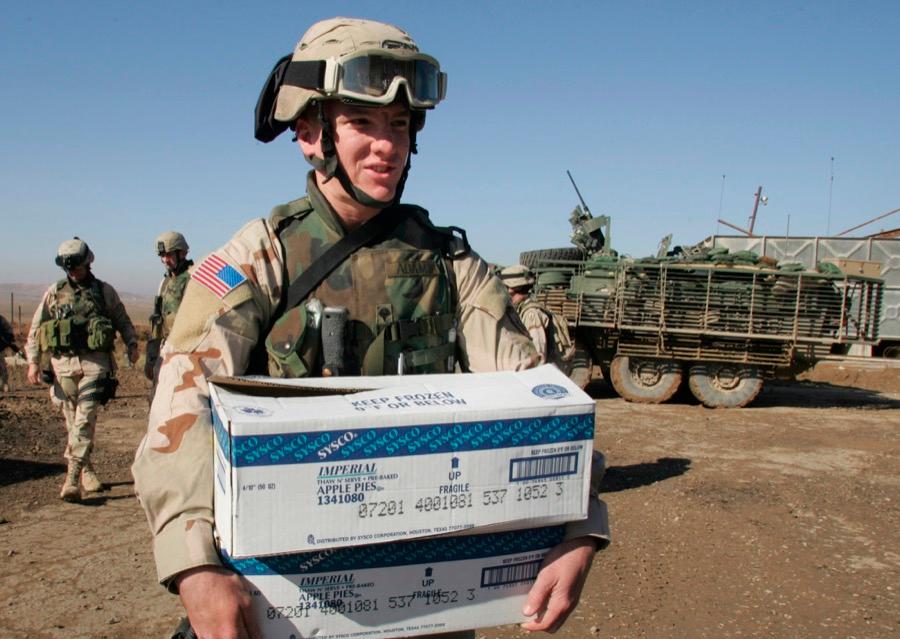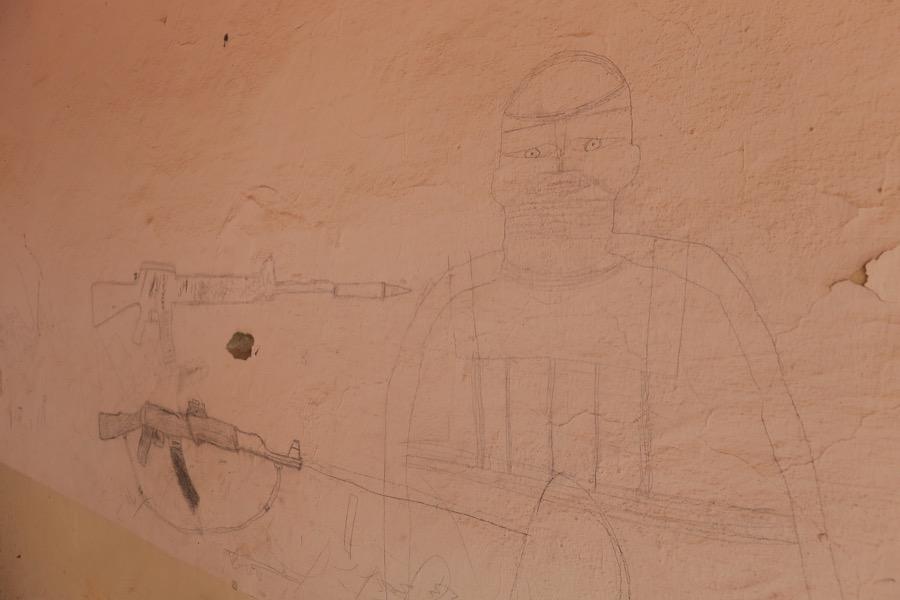ISIS forced this Iraqi teacher to change all his lessons — ‘it became all about death’
Riyad al-Jaboury, an Iraqi English teacher, with his birds in his yard in Hamam al-Alil, northern Iraq.
Riyad al-Joboury remembers the day ISIS came to his house.
It was early in the morning. He was half asleep when he heard the gate to his front yard creaking open and the murmur of voices he didn’t recognize.
“I woke up to see what was happening, and I found the house was filled with Daesh members,” Riyad says, using the Arabic acronym for the extremist group. “They were carrying weapons, surrounding me and shouting at me.”
They had not come for him, but for his father, who was a colonel in an Iraqi army bomb disposal unit. They dragged the colonel out of the house and into a car and drove away.
“I went to look for him, for his body. They said, ‘Don’t look for him or you will follow him, [we] will kill you.’”
Riyad never saw his father again.
In the summer of 2014, their town was one of dozens captured by ISIS as it swept across large parts of Iraq.
ISIS’ path through Iraq

Over the next few years, despite the chaos surrounding him, Riyad set out to build a life for himself. He enrolled into college, got married, had two children, and started teaching at an elementary school in the town.
During those same years, the Islamic State in Iraq — the precursor to ISIS — grew in strength. What began as an insurgency against US troops in the country transformed itself across the border in Syria into a powerful quasi-state.
When ISIS fighters stormed into Iraq in 2014, it came as a shock to the world. But the people of Hamam al-Alil were familiar with the group. ISIS had been carrying out regular attacks on government forces and police in the town. Reprisals by the Iraqi army came in the form of mass arrests. Young men would disappear after being detained for suspected militant activity.
The situation became so chaotic that many people welcomed ISIS when it took Hamam al-Alil, finally coming out into the open.
“To be honest with you, most of the people supported Daesh when they came, because they told everyone they would bring peace,” he says.
ISIS, which had been attacking the town daily, would behave differently as rulers, residents hoped.
“But that didn’t happen, actually,” Riyad says, “because Daesh showed us their true face. They became the worst creature that walked on this ground — even worse than the devil himself.”
Riyad was forced to carry on teaching at the school. Where before he had taught dozens of pupils, now he had only seven, all of whom were the sons of ISIS fighters.

“They forced us to go back. They said they would hang us on the bridge if you do not go to school,” Riyad says.
He says ISIS “changed all the lessons — it became all about death.”
“They teach them that all the world is wrong, and we are the only right way.”
He felt conflicted teaching children under ISIS. But he felt he had no choice.
“We had to act. We have to pretend that we are with them. They tell their parents how we are teaching and if we are with them or not. You cannot show that you are against them, in order not to be killed.”
It soon became clear that the ISIS occupation of Hamam al-Alil was going to last a while. The militants set up a jail in the house across the street from Riyad’s.
“We heard the screaming of the men,” he says. “It was worse than the rocket sound. It’s something unbelievable when you hear the men screaming. It’s something hard to believe.”
oembed://https%3A//www.youtube.com/watch%3Fv%3DRuZhG9yRXLg%26feature%3Dyoutu.be
After ISIS fighters took away his father, Riyad went into survival mode. He moved his wife, mother and daughters to his grandparents’ house on the other side of town, away from the screams. And he stopped leaving the house. He was too afraid to go to the market.
At first, as rulers, ISIS’ violence against residents was more discrete, he recalls. But, he says, “Towards the end [of their occupation], they were killing people in the street, they weren’t afraid of anything. They want everybody to know that in order to be afraid of Daesh, and they will face the same fate.”
Staying alive meant avoiding ISIS fighters at all costs, but it also required keeping himself sane. Riyad was a voracious reader before the militant group came along, but he says he didn’t feel like picking up a book while ISIS was there.
So, he created an oasis in his garden. He constructed two large birdcages in the front yard, about 6 feet high, and filled them with brightly colored parakeets. He built a small gym. And for the backyard he got chickens, pigeons and three beehives.
“We had nothing to do. Our house became a jail. So we became birdmen,” he says.
“We created our own world. You have to manage how to kill your time. In the past I was in love with stories. But when Daesh come we couldn’t read, we don’t have the mood, so we just make fun looking at the animals.”
oembed://https%3A//www.youtube.com/watch%3Fv%3D9yCBJpwT0R8%26feature%3Dyoutu.be
Riyad walks around his garden, stopping at each cage and admiring his parakeets. He says he plans to buy more pigeons.
Despite his ordeal, Riyad is a relentlessly positive man. He can even find a silver lining of the past two and a half years of ISIS rule.
“The town has changed, but changed in a good way. Because the people who were supporting Daesh’s ideas, they know who Daesh is now. They showed their true face. So let’s hope that they will not welcome them again,” he says.
Riyad is back teaching at school now. All his brothers and sisters are back in the family home, which is still marked by bullet and artillery holes from the battle that forced ISIS out. A picture of his father hangs in pride of place in the living room.
When asked if he is hopeful for the future, he replies: “Of course. We are always hopeful. If we were not, we wouldn’t have got the birds.”
This story is part of the series Iraq Interrupted: stories of survival from Iraqi men and women who have struggled and persevered through more than a decade of conflict. Click here for another profile, of Zikra Younis, an Iraqi woman who escaped ISIS rule and her husband.
The story you just read is accessible and free to all because thousands of listeners and readers contribute to our nonprofit newsroom. We go deep to bring you the human-centered international reporting that you know you can trust. To do this work and to do it well, we rely on the support of our listeners. If you appreciated our coverage this year, if there was a story that made you pause or a song that moved you, would you consider making a gift to sustain our work through 2024 and beyond?